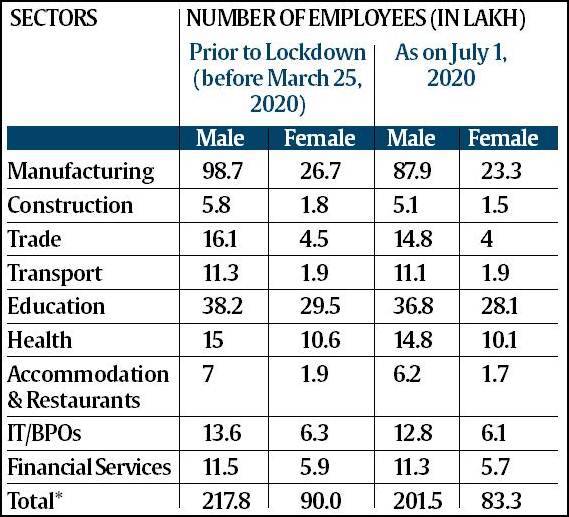Indian Economy
Job Losses During 2020 Lockdown
- 02 Dec 2021
- 4 min read
Why in News
Recently, the Ministry of Labour and Employment presented the data on job loss during the 2020 lockdown for Covid pandemic.
- The data is based on the All India Quarterly Establishment based Employment Survey (AQEES).
Key Points
- About:
- All-India Quarterly Establishment-based Employment Survey (AQEES): The AQEES has been taken up by the Labour Bureau to provide frequent (quarterly) updates about the employment and related variables of establishments, in both organised and unorganised segments of nine selected sectors.
- The 9 sectors are Manufacturing, Construction, Trade, Transport, Education, Health, Accommodation and Restaurants, IT/BPO, Financial Service Activities.
- Components:
- Quarterly Employment Survey (QES): It provides the employment estimates for the establishments employing 10 or more workers.
- The revamped QES was conducted during the first quarter (April-June 2021).
- The earlier version of QES was suspended in 2018, citing a gap in numbers with the payroll data.
- Area Frame Establishment Survey (AFES): It covers the unorganised segment (with less than 10 workers) through a sample survey.
- Quarterly Employment Survey (QES): It provides the employment estimates for the establishments employing 10 or more workers.
- All-India Quarterly Establishment-based Employment Survey (AQEES): The AQEES has been taken up by the Labour Bureau to provide frequent (quarterly) updates about the employment and related variables of establishments, in both organised and unorganised segments of nine selected sectors.
- Major Findings:
- Manufacturing sector: It recorded job losses of 14.2 lakh between the pre-lockdown (March 2020) and post-lockdown (July 2020) period.
- About 7.5 % job losses were seen during the lockdown for Covid pandemic in 2020.
- Financial services sector: It recorded a job loss of 0.4 lakh and 1 lakh for the IT/BPOs sector during the same period.
- Other sectors: Construction sector recorded a loss of 1 lakh, while trade and education sectors registered job losses of 1.8 lakh and 2.8 lakh, respectively.
- Female workers: Females registered a job loss of 7.44 % among the nine key sectors.
- Female employment in the manufacturing sector reduced to 23.3 lakh (as on July 2020) from 26.7 lakh (as on March 2020).
- Female workers in the construction sector were reduced to 1.5 lakh from 1.8 lakh.
- Female employment in the trade sector reduced to 4 lakh (as on July 1, 2020) from 4.5 lakh (as on March 2020)
- Male workers: Males registered a job loss of 7.48 % between the pre-lockdown and post-lockdown period.
- Male workers in manufacturing during the same period reduced to 87.9 lakh from 98.7 lakh.
- Male workers in the construction sector were reduced to 5.1 lakh from 5.8 lakh during the lockdown.
- Male employment in the trade sector reduced to 14.8 lakh (as on July 2020) from 16.1 lakh (as on March 2020).
- Manufacturing sector: It recorded job losses of 14.2 lakh between the pre-lockdown (March 2020) and post-lockdown (July 2020) period.
- Latest Findings:
- The new quarterly employment survey released in September had shown employment in key nine sectors rising to 3.08 crore in April-June 2021 from 2.37 crore in 2013-14.
- The base year was chosen based on the sixth economic census.
- Employment in the organised non-farm segment decreased in 27 % of the establishments due to the pandemic.
- As much as 81 % of the workers received full wages during the lockdown period (March 2020-June 2020), 16 % received reduced wages and only 3 % were denied any wages.
- The new quarterly employment survey released in September had shown employment in key nine sectors rising to 3.08 crore in April-June 2021 from 2.37 crore in 2013-14.
- Significance:
- Information gathered through these surveys would enable the government to understand significant issues and help to frame evidence-based National Employment Policy.
- Other than this the ministry has launched two more surveys namely, All-India Survey of Migrant Workers and All-India Survey on Domestic Workers.
- Information gathered through these surveys would enable the government to understand significant issues and help to frame evidence-based National Employment Policy.
- Related Initiatives:





